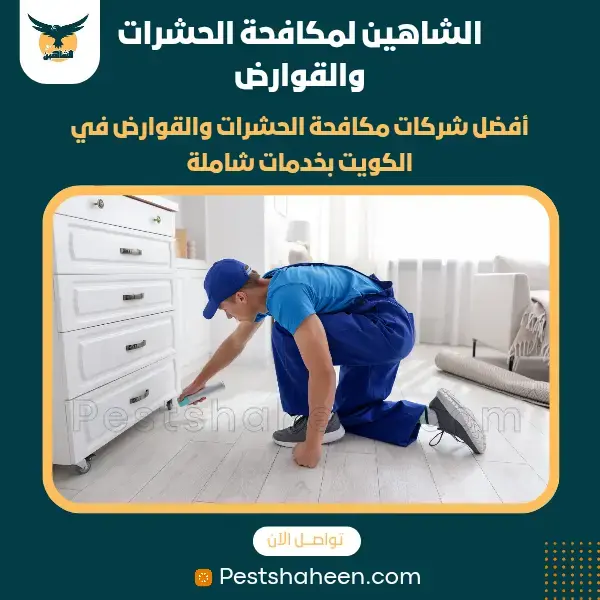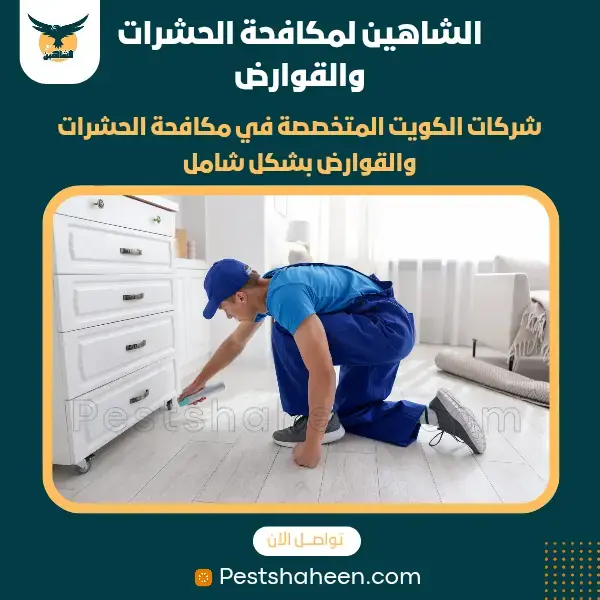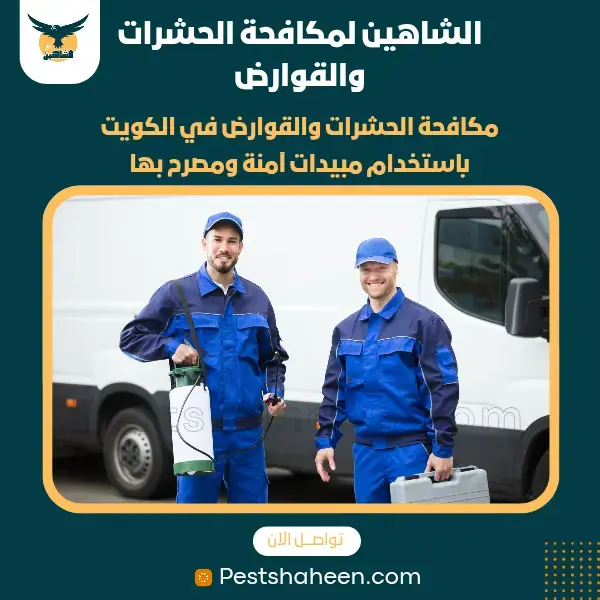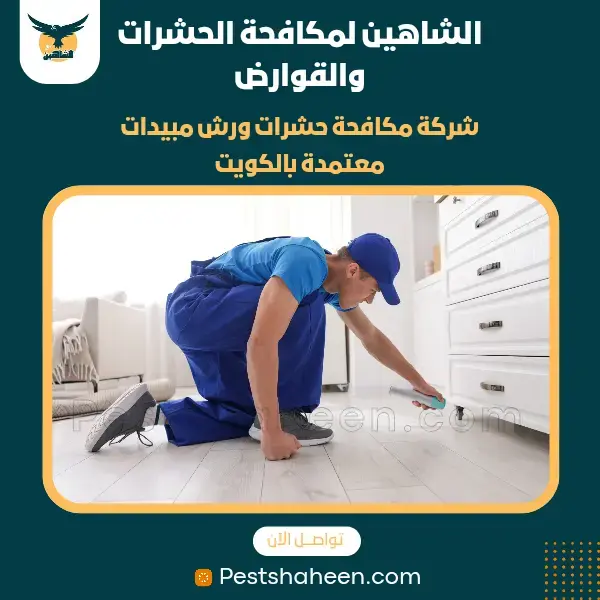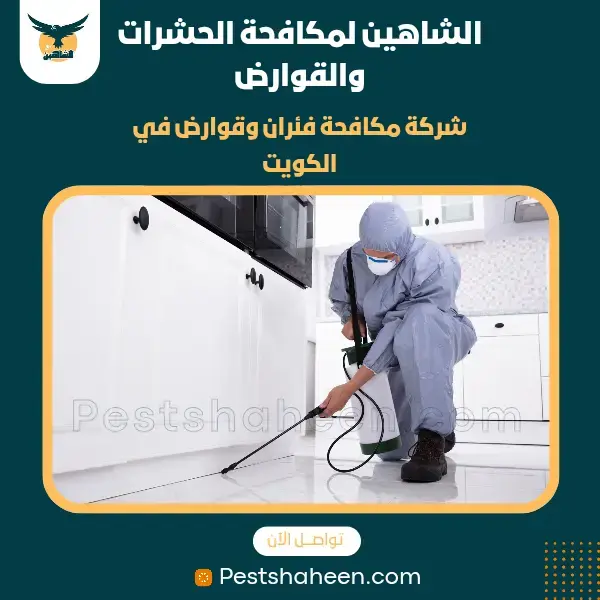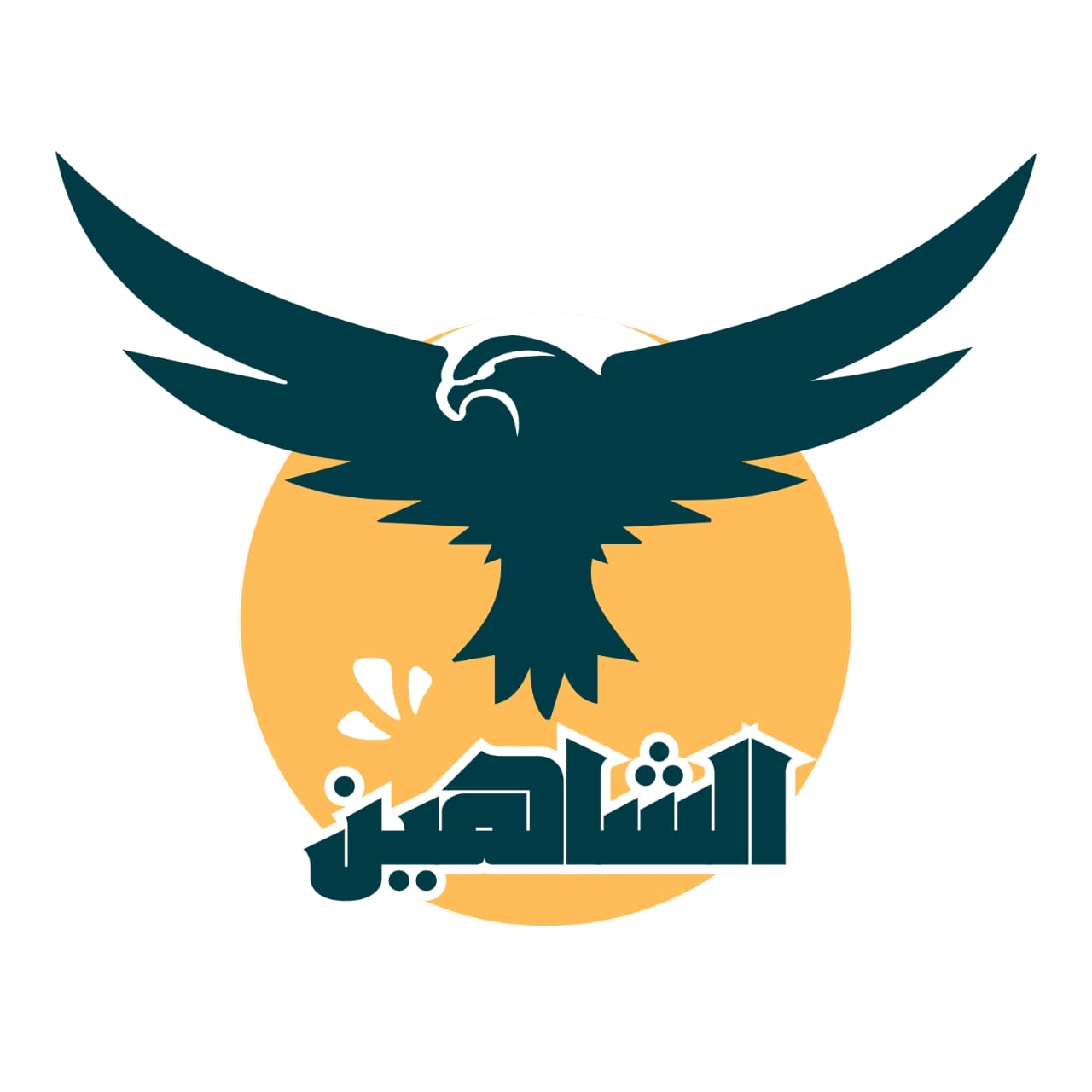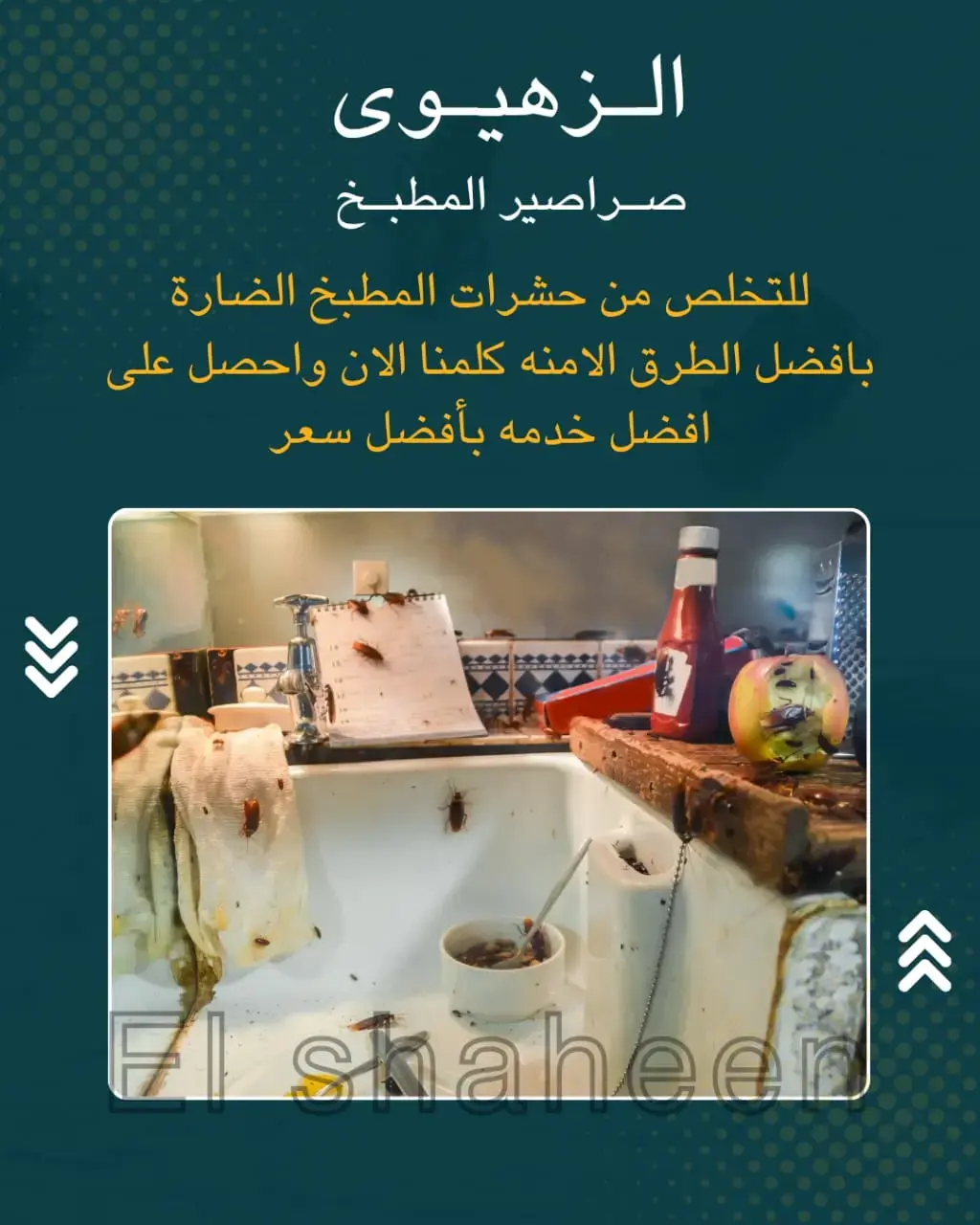
Tips After Cockroach Treatment in Abdullah Al-Salem Area
In the hot and humid climate that characterizes Kuwait, household insects spread in an annoying manner, with the "Zahiwi" being one of the most dangerous pests in homes and residential buildings. As this insect continues to appear even in clean and modern houses, it has become essential to deal with it professionally and using modern scientific methods to ensure its eradication and prevent its return.
Zahiwi control is not a luxury option, but a necessity to maintain a healthy and safe environment. In this article, we highlight the most important tips after spraying for Zahiwi in Abdullah Al-Salem District and review the differences between the types of control (spraying, gel, injection), and provide detailed information about the pesticides and materials used in the Kuwaiti market, drawing on the experience of Al-Shahin Pest Control Company in this field.
What is the Zahiwi? And why is it considered one of the most dangerous household insects?
The Zahiwi, also known as the German cockroach or small cockroach, is one of the most common and widespread household pests, especially in warm and enclosed areas. The Zahiwi is characterized by its small size, yellowish-brown color, and high speed, making it difficult to detect easily. It often hides in cracks, behind electrical appliances, and under sinks, making it a constant threat to home cleanliness and the health of its occupants.
The danger of the Zahiwi lies in its ability to transmit germs and bacteria, as it feeds on waste and decomposed materials, then roams on food surfaces and kitchen utensils. Additionally, it has a high reproductive capacity — a single female can produce hundreds of offspring within a few months. Neglecting its control can lead to widespread infestation that becomes difficult to manage using traditional methods.
Why does Abdullah Al-Salem District require regular Zahiwi control?
Abdullah Al-Salem is one of the upscale and densely populated residential areas in Kuwait's capital. However, that doesn’t prevent it from being a fertile environment for insect outbreaks due to several factors that necessitate regular and effective pest control:
-
High temperatures and humidity for most of the year
-
Many open kitchens and nearby restaurants
-
Presence of old sewage systems in some buildings
-
Intensive use of air conditioners that provide ideal hiding spots
-
Poor ventilation in some villas and residential units
-
Long-term storage of food inside homes

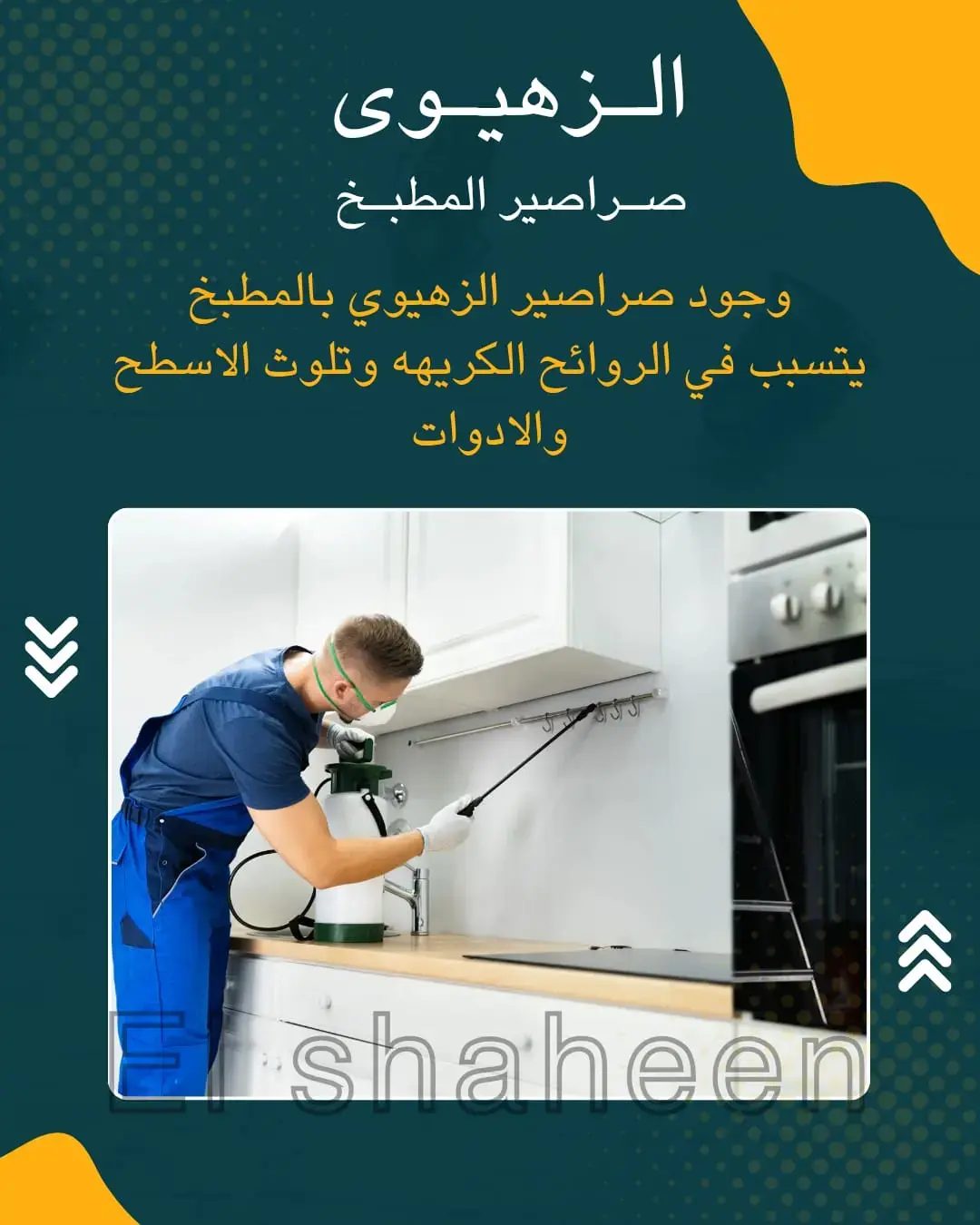
Al-Shahin Pest Control Company: Experience and Professionalism Serving Kuwait’s Residents
Al-Shahin is considered one of the leading companies specialized in pest control in Kuwait, particularly in Abdullah Al-Salem. Thanks to its extensive experience and professional team, the company has achieved tangible results in eliminating Zahiwi using advanced techniques and safe materials licensed by official authorities. The company follows a comprehensive treatment plan that includes inspection, diagnosis, and selecting the most suitable method (spray, gel, or injection) depending on the situation, providing clients with long-term comfort and assurance.
Modern Methods for Zahiwi Control: Spraying, Gel, and Injection
With the evolution of pest control techniques, dealing with Zahiwi is no longer limited to traditional methods that may not yield long-term results. Today, professional companies like Al-Shahin rely on three main techniques to control Zahiwi: spraying, gel, and injection. Each is used based on the level of infestation and the nature of the target site.
-
Chemical Spraying: Used when the Zahiwi infestation is visible and widespread. This method relies on special sprays containing fast-acting active substances.
-
Gel (Bait Paste): Applied locally in hiding spots of Zahiwi. It attracts the insect and eliminates it gradually. It's very suitable for kitchens and areas that are hard to spray.
-
Injection into cracks and openings: A precise technique used when infestations are hidden or recurrent. It involves injecting concentrated pesticides into walls and tight corners.
Each of these methods has its own characteristics, and sometimes a combination of more than one technique is recommended to achieve the best possible outcome.
The Difference Between Preventive and Emergency Zahiwi Treatment
It’s important to distinguish between two types of Zahiwi control services, as each depends on the timing of intervention and the severity of infestation:
-
Preventive Treatment: Conducted periodically even when there’s no clear presence of pests. Its goal is preemptive protection and to prevent future infestations. It’s commonly used in new homes or after thorough sanitation.
-
Emergency Treatment: Applied when the infestation is already present and bothersome, such as seeing Zahiwi in kitchens or bathrooms frequently. This service uses stronger materials and more intensive procedures for rapid pest elimination.
Preventive treatment saves you from many health and financial damages, while emergency treatment is a quick fix that requires follow-up to ensure the pests do not return.
What Is the Best Way to Get Rid of Zahiwi Permanently: Spray, Gel, or Injection?
A common question among clients is: which of the three methods guarantees complete elimination of Zahiwi? The answer depends on the nature, location, and severity of the infestation. However, it can be summarized as follows:
-
Spraying is the fastest in terms of effect and is preferred in cases of widespread infestation. However, it might not reach deep hiding nests, making follow-up essential.
-
Gel is considered one of the most successful methods for eliminating Zahiwi inside homes, especially in kitchens. It targets the insect directly through bait and does not contaminate the environment.
-
Injection is the ideal option for stubborn or recurrent infestations, as it targets unseen hiding spots of the insect.
Thus, the best method is often a combination of more than one approach within a comprehensive treatment plan — and this is what Al-Shahin Company implements to ensure effective and long-lasting results.
Learn More: How to Get Rid of Zahiwi in Kuwait City
Types of Zahiwi Pesticides Approved in Kuwait
Several types of pesticides are used in combating Zahiwi in Kuwait, each carefully selected based on the level of infestation and the nature of the location. Among the most prominent active substances approved by pest control companies such as Al-Shahin are:
-
Cypermethrin: A strong pesticide from the pyrethroid family, it affects the insect's nervous system and is commonly used in surface spraying. It is effective and fast-acting but requires avoiding direct contact after spraying.
-
Fipronil: An advanced neurotoxic pesticide used in gel baits, spraying, and injection. It is highly effective against Zahiwi and works even in small doses.
-
Hydramethylnon: Found in Zahiwi gel formulations, it works through slow action, allowing insects to carry the poison back to their nests, resulting in mass extermination of the pest.
-
Imidacloprid: An active ingredient from the neonicotinoid family, commonly used in gel baits and indoor sprays. It adheres to surfaces and remains effective for long periods without losing its potency.
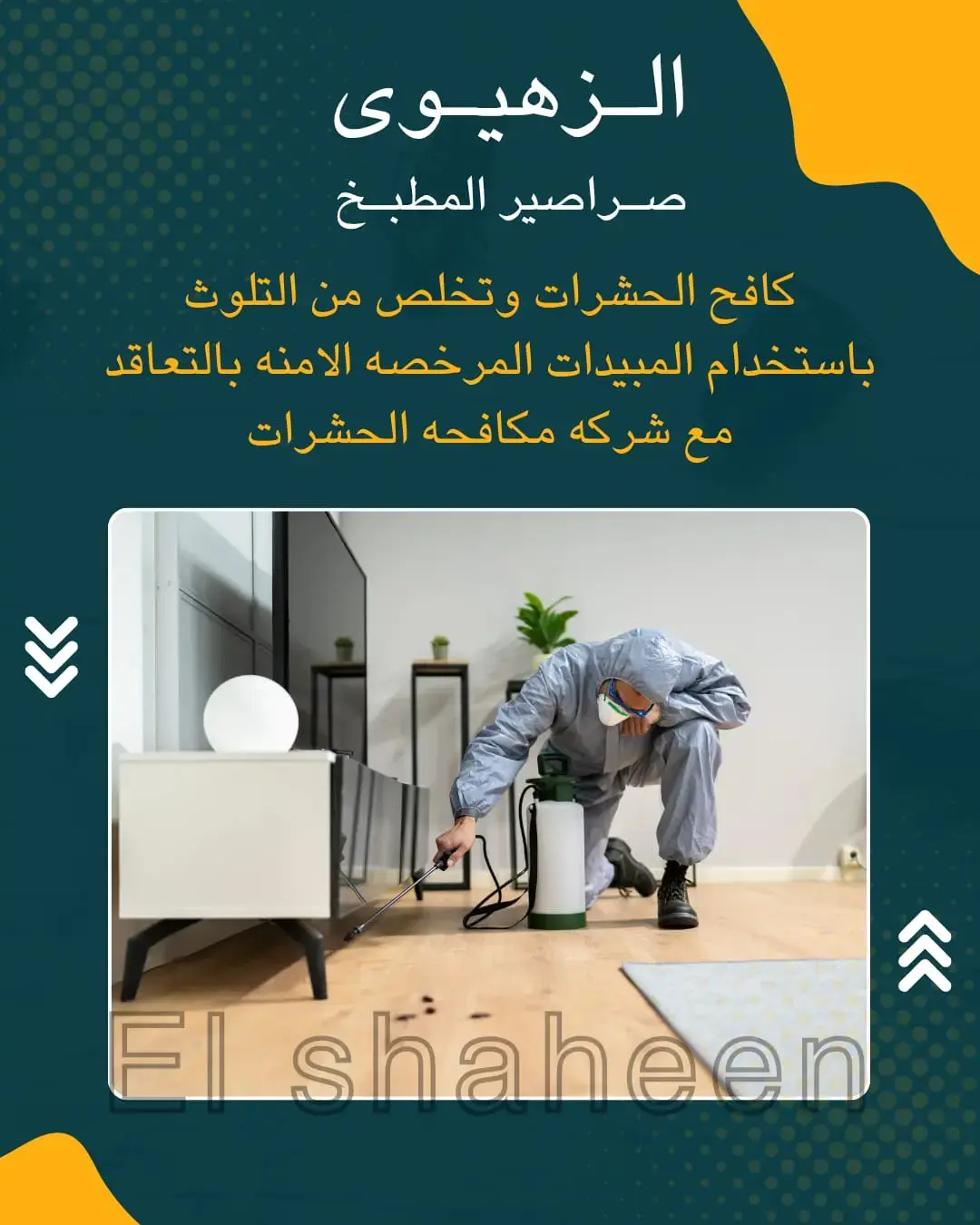
Fipronil: High Effectiveness and Long-lasting Impact
Fipronil is considered one of the most effective substances currently used in Zahiwi control in Kuwait. It has a strong effect on the insect’s nervous system, causing paralysis and eventual death in a short time. What sets Fipronil apart is that it doesn’t kill the insect immediately, allowing it time to return to the nest and spread the substance among the rest of the colony — a crucial feature in eliminating Zahiwi, which reproduces quickly and hides in tight spaces.
Fipronil is used in gel, spray, and even injection inside walls, making it an ideal choice in moderate to severe infestations. Its effectiveness can last for several weeks, providing long-term protection after application.
Advantages of Spraying in Zahiwi Control
Spraying remains one of the oldest and most widely used methods for controlling Zahiwi, and it continues to be favored due to several benefits:
-
Quick action: Provides immediate results in cases of visible infestation.
-
Comprehensive coverage: Reaches corners, cracks, and floors where Zahiwi might be hiding.
-
Can be combined with other methods: Such as gel or injection to form a comprehensive treatment plan.
-
Suitable for large areas: Such as big kitchens, storage rooms, and multi-story houses.
-
Effective against heavy infestations: When the infestation is evident and requires direct, rapid intervention.
When Should Spraying Be Avoided? Special Cases to Consider
Despite its effectiveness, there are situations where spraying is not recommended or should be postponed:
-
Presence of infants or people with respiratory conditions in the home
-
Presence of small pets that may be affected by the pesticides
-
Inability to vacate the home for a sufficient period after spraying (usually 4–6 hours)
-
Open kitchens with uncovered food items
-
Situations that require precise, localized treatment without surface contamination (gel or injection is preferred)
In such cases, Al-Shahin Company evaluates the situation and offers the most suitable alternatives to ensure residents’ safety and quality results.
Tips After Spraying for Zahiwi: What to Do and Avoid
After completing the Zahiwi spraying process indoors, it is important to follow a set of instructions to ensure the best possible results without affecting the health of residents or pets. Adhering to these tips helps stabilize the pesticide’s effectiveness and prevents the insect from returning:
What to Do After Spraying:
-
Leave the house immediately for no less than 4 to 6 hours, depending on the type of material used.
-
Ventilate the house well upon return by opening windows and using fans to expel remaining fumes.
-
Clean only exposed surfaces, especially kitchen counters and food preparation areas — but avoid wiping corners or directly sprayed areas.
-
Monitor the infestation sites over the following days to assess the effect of the spray, as dead or slow-moving Zahiwi may appear.
-
Ensure daily garbage disposal and avoid leaving food uncovered.
-
Keep the company’s contact number handy for follow-up or to request a return visit if necessary.
What to Avoid After Spraying:
-
Do not mop floors or wipe walls immediately after spraying, as this removes the active substance and reduces its effectiveness. It’s advised to wait 3 to 5 days before any thorough cleaning.
-
Avoid using vacuum cleaners or wet mops in the sprayed corners and cracks.
-
Do not bring pets back in immediately; wait until the area is fully ventilated and completely dry.
-
Do not use additional pesticides on your own after spraying, as they may interact with the original substance or reduce its effectiveness.
By following these guidelines, you can make the most out of the spraying process and ensure effective elimination of Zahiwi without side effects or complications in the home.
Also Read: Post-Spray Tips in Al-Salihiya – How to Keep Your Home Pest-Free
Is Zahiwi Spraying Safe for Children and Pets? Safety and Security Tips
Zahiwi spraying is relatively safe for children and pets if carried out by a professional company like Al-Shahin and if the instructions are followed precisely. Most of the pesticides used today in Kuwait are licensed by health authorities and are regulated. However, there are still some important precautions that should be taken to ensure complete safety within the home.
Safety and Security Tips:
-
Vacate the house completely after spraying, especially infants and pets such as cats, dogs, and birds. It is preferable that the absence lasts no less than 4 to 6 hours.
-
Do not allow children to play on floors or touch corners and walls within the first 24 hours of returning home.
-
Ensure that all surfaces are dry before allowing contact or use.
-
Wash cooking and dining utensils thoroughly if they were located near the sprayed areas, even if covered.
-
Keep any leftover pesticide containers out of children's reach (in case the client requested to keep them for follow-up use).
-
Do not allow pets to roam freely inside the house immediately after returning. It is recommended to wait a few extra hours with proper ventilation.
In short, spraying is safe if done according to clear guidelines and standards. By following these simple tips, there will be no negative impact on the health of children or pets. On the contrary — it will help create a healthy environment free of insects and bacteria transmitted by Zahiwi.
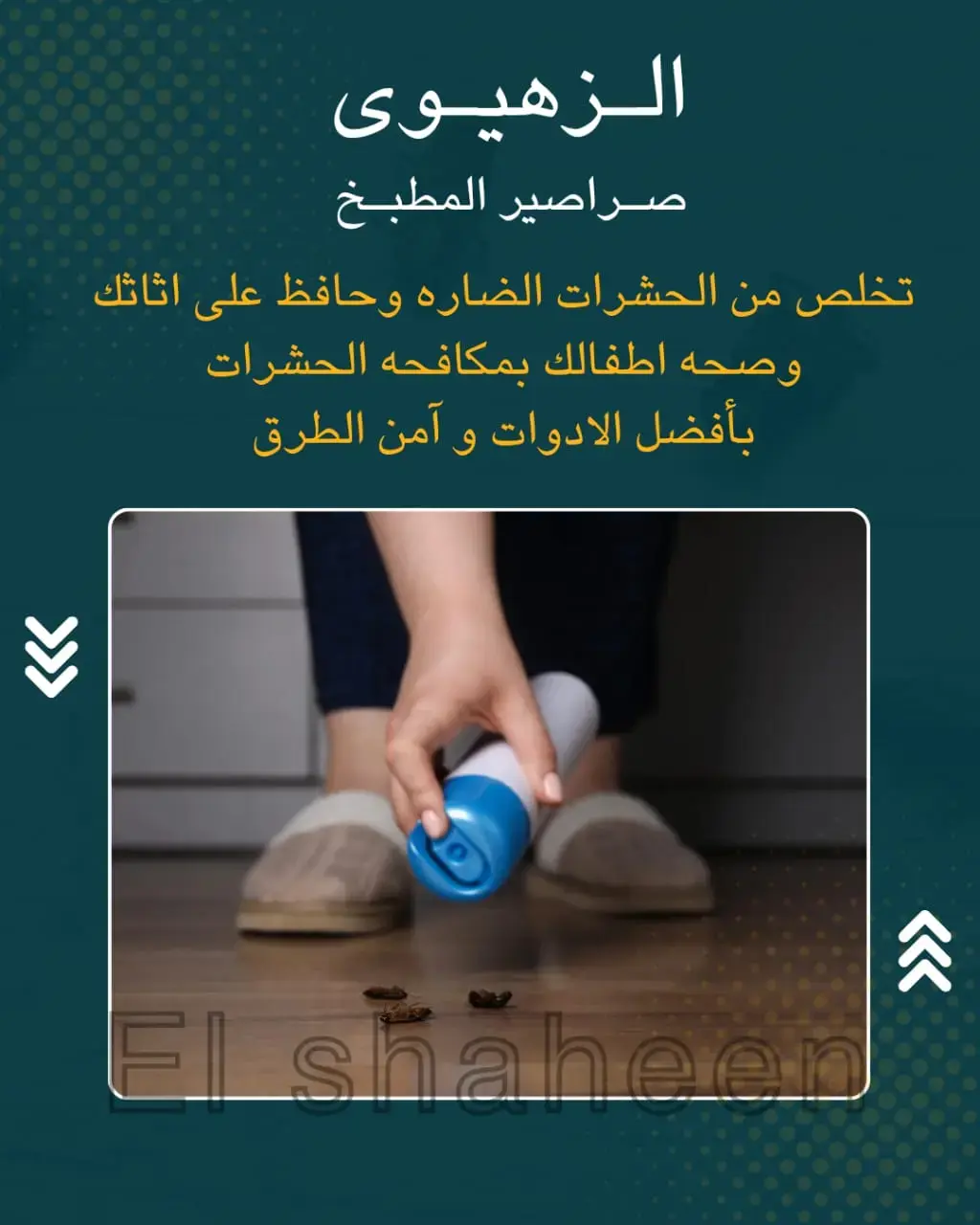
What Is Zahiwi Control Gel? And When Should It Be Used?
Zahiwi control gel is a semi-solid bait containing an active, attractive, and lethal ingredient for small cockroaches (Zahiwi). It is applied in dots or thin lines in the insect’s hiding places, such as behind electrical appliances, under sinks, and inside joints and cracks.
What makes gel unique is that it produces no odor, requires no evacuation, and does not need ventilation, making it an ideal option for kitchens, clinics, restaurants, or homes with children and pets.
Gel is recommended in the following cases:
-
When there is a light or moderate Zahiwi infestation
-
In locations where spraying is difficult or prohibited
-
As a complementary treatment after spraying to ensure the elimination of remaining nests
-
In environments that must remain clean during pest control (such as medical clinics or restaurants)
Best Types of Gel Available in the Kuwaiti Market:
-
Advion Cockroach Gel: Considered one of the strongest gels globally. Contains the active ingredient Indoxacarb. Highly attractive to Zahiwi, fast-acting, and capable of eradicating the entire colony.
-
Maxforce FC Gel: Contains Fipronil and is one of the most widely used types in Kuwait. Very effective against Zahiwi, used in tight and critical areas, and provides extended residual effects lasting weeks.
-
Combat Roach Killing Gel: A powerful and easy-to-use bait. Features a strong formula that directly targets Zahiwi and allows the insect to carry the poison back to the colony. Readily available in markets and suitable for home or professional use.
-
Vendetta Plus Gel Bait: Features a dual-action formula that includes both a food attractant and a lethal active ingredient. Suitable for sensitive environments and especially effective against resistant Zahiwi strains.
-
Roach Doctor Cockroach Gel: A product suitable for households and personal use, effective in eliminating limited numbers of Zahiwi, but not intended for severe infestations.
Combat Roach Killing Gel: Effectiveness and Ease of Use
Combat Roach Killing Gel is one of the approved baits in the Kuwaiti market and is widely used by pest control companies as well as individuals for home use. This gel is characterized by its combination of high attractiveness to Zahiwi and rapid effect. The insect consumes the gel and returns to the nest, allowing the toxic substance to spread to other colony members.
The gel comes in a tube that is easy to use in narrow spaces without any special equipment, making it a practical option for kitchens and bathrooms. Its effectiveness lasts for weeks, reducing the need for frequent reapplication.
Read more about: Zahiwi Gel Injection in Al-Murqab.
Types of Injection Used in Kuwait and Their Most Popular Products
Advion Gel Syringe
Widely used in Kuwait, it contains the active ingredient Indoxacarb. Known for its high effectiveness against Zahiwi even in humid environments, it is considered a professional-grade option approved by pest control companies.
Maxforce Gel Syringe
Relies on the lethal Fipronil compound, featuring high attractiveness and long-lasting effects. Often used in tight or enclosed spaces where spraying is not feasible.
Boric Gel Syringe
Boric acid is a naturally derived and relatively safe substance, used in localized injections inside joints and cracks. Suitable for sensitive residential environments.
Vendetta Syringe
Contains a special bait and powerful compounds against small cockroaches. Known for its quick kill and colony control. It’s a popular American product in the Kuwaiti market.
Combat Syringe
A practical and easy-to-use product, featuring a fast-acting bait. Commonly used for light infestations or as a complementary solution after spraying. Available in retail stores and pest control supply shops.
Maxforce Injection: High Precision in Targeting Zahiwi Nests
Maxforce Gel Syringe is one of the leading products for Zahiwi control in Kuwait, especially in cases where spraying or open gel use is difficult. It contains the active ingredient Fipronil, a neurotoxic compound that gradually paralyzes Zahiwi, allowing the poison to spread to other colony members before the insect dies.
What makes Maxforce injection stand out is its high precision — the bait can be applied directly inside small cracks and crevices, which are primary hiding spots for Zahiwi. Its effectiveness lasts for several weeks without the need for reapplication, making it an ideal choice for upscale residential environments and commercial kitchens.
Advantages of Injection Compared to Gel and Spraying
-
Precision and direct targeting: Allows the substance to be applied precisely without contaminating other areas.
-
Long-lasting effect: Most injection products remain effective for several weeks, reducing the need for frequent reapplication.
-
No need to vacate the premises: Safe for use while residents remain at home, unlike spraying which requires evacuation.
-
Effective for deep or recurring infestations: Reaches nests that are difficult to access with gel or surface sprays.
Places Where Injection Is Preferred Over Other Methods
-
Inside wall and floor cracks and crevices
-
Behind electrical appliances like refrigerators and kitchen ovens
-
Inside closed cupboards and wardrobes where spraying is not advisable
-
In restaurants and medical clinics that require clean, discreet methods
-
In new residential villas that suffer from infestation despite general cleanliness
When Should Spraying Be Repeated? Can Zahiwi Return?
The effectiveness of Zahiwi spraying is usually temporary and depends on several factors, including the type of pesticide used, the severity of the infestation, and the nature of the environment. Under normal conditions, it is recommended to repeat spraying every 3 to 6 months as a preventive measure, especially in areas prone to insect activity such as kitchens, storage areas, and bathrooms.
If Zahiwi reappears shortly after spraying, the cause could be one of the following:
-
Failure to reach deep nests during the initial treatment
-
Continued presence of attractants (moisture, food residue, unsealed vents)
-
Use of low-quality pesticide or unprofessional application
-
Resistance of certain Zahiwi strains to conventional pesticides
It is normal to see a few insects after spraying — they are often in the process of dying. However, if the problem persists two weeks post-treatment, the pest control company should be contacted for reassessment and possible follow-up service.
Should You Clean the House After Spraying or Leave It As Is? Important Guidelines
Cleaning the house after spraying requires a delicate balance between maintaining hygiene and preserving the pesticide's effectiveness. Here are the key instructions:
Recommended:
-
Clean frequently touched surfaces, such as dining tables and kitchen countertops, using a cloth dampened with mild soap.
-
Leave corners, cracks, and sprayed areas untouched for 3 to 5 days to avoid removing the active substance.
-
Sweep dry floors the following day, avoiding wet mopping during the first 48 hours.
-
Ventilate the home well after spraying to reduce vapor concentration and improve air quality.
Avoid:
-
Do not wipe walls or edges immediately after spraying.
-
Do not use strong cleaners or solvents over sprayed areas.
-
Avoid washing floors with water during the first two days, especially in treated spots.
Following these guidelines helps maintain the effectiveness of the spray and prevents Zahiwi from returning within a short period.
Learn More About: How to Get Rid of Zahiwi in Qibla.
Why Do Residents of Abdullah Al-Salem Choose Al-Shahin Company?
Residents of Abdullah Al-Salem prefer Al-Shahin Pest Control Company for several reasons that make it the top choice in the area. First, the company has extensive experience dealing with common pests in Kuwait, particularly Zahiwi, and it fully understands the construction styles and environmental conditions specific to the district. Second, Al-Shahin offers fast and professional service carried out by trained technicians using modern equipment, along with licensed pesticides that are safe for children and pets.
Moreover, the company keeps up with the latest techniques, such as gel treatments and precision injections, and does not rely solely on traditional spraying. This provides clients with effective solutions tailored to the specific needs of each home. Additionally, Al-Shahin offers reliable warranties and free follow-up services in case the pest reappears, which boosts customer confidence and provides peace of mind — something most other companies don’t offer. Therefore, Al-Shahin is no longer just a service provider; it has become a trusted partner in protecting homes from pests in one of Kuwait’s most prestigious neighborhoods.
Frequently Asked Questions About Zahiwi Control in Kuwait
Below are a set of common questions asked by clients before and after Zahiwi control, along with brief answers explaining key points:
Can the results of spraying or gel application be seen on the same day?
Yes. With spraying, some results may appear within hours, while gel and injections usually take 24 to 72 hours to reach full effectiveness.
Do pests return after a while?
They may return if the nests aren’t fully eliminated or if the root causes (like moisture or food residues) aren’t addressed. That’s why regular follow-up is recommended.
Is spraying completely safe for children?
It is safe when post-spray instructions are followed and the home is vacated for the recommended period, especially when using pesticides licensed by the Ministry of Health.
What’s the difference between gel and injection?
Gel is applied on surfaces in small dots to attract insects, while injection is used inside cracks and joints to reach deep nests.
How often should the service be repeated?
Typically every 3 to 6 months, but some cases may require retreatment within a few weeks depending on the situation.
Zahiwi control is not just a routine procedure — it’s a primary line of defense for protecting your home’s health and your family’s comfort. Al-Shahin Company has proven itself as one of the best options in Abdullah Al-Salem, thanks to its high-quality service, effective materials, and advanced techniques including spraying, gel, and injection.
Whether you’re dealing with a light infestation or a recurring problem, choosing the right and reliable company is what makes the real difference. Contact Al-Shahin today and enjoy a clean, safe, and Zahiwi-free environment… because prevention is better than delayed action.
